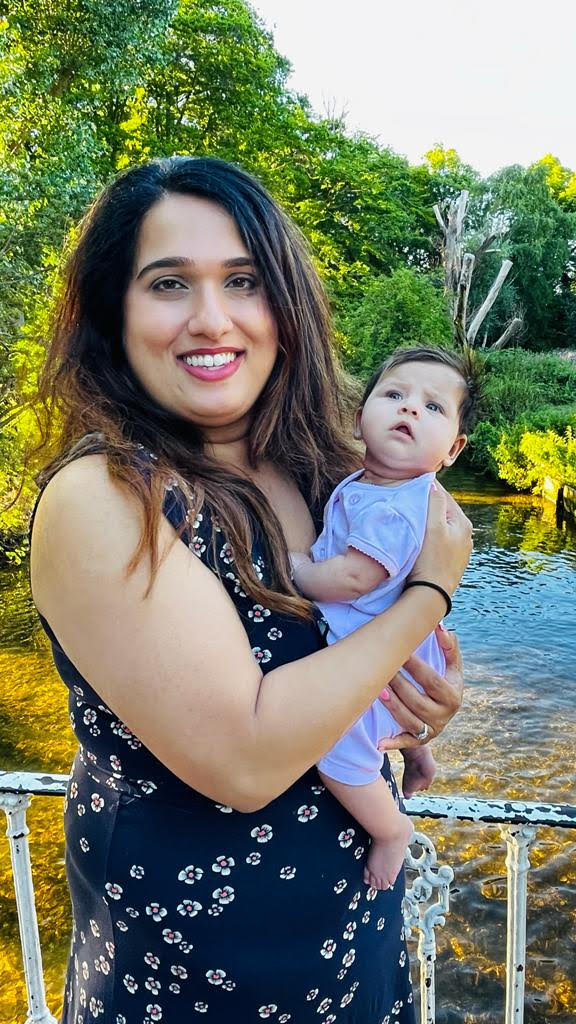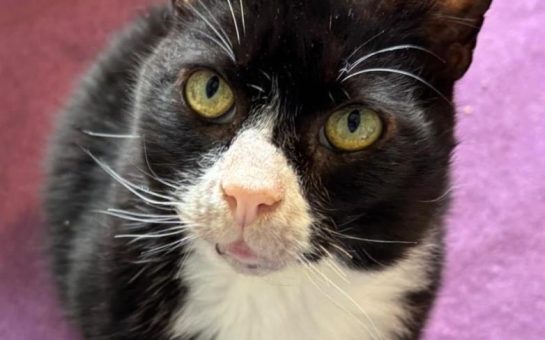An ongoing national COVID-19 vaccine study is urging more pregnant women across south London to volunteer.
The Preg-CoV study, running at St George’s University Hospitals NHS Foundation Trust in Tooting, currently has around 300 pregnant women taking part nationally and aims to determine the best vaccine schedules and doses to protect women and their babies against COVID-19.
Gursharon, 36, from Merton is taking part in the study, which is being supported by the NIHR Clinical Research Network South London.
The 36-year-old had three miscarriages before giving birth to her daughter, Amira, in April of this year at St George’s Hospital and said that research has given her everything she wanted from life.
She explained: “I’ve wanted to be a mum for such a long time. This pregnancy was so important because my husband, Dennis, and I both really wanted to have a baby.
“I love being a parent, it is hard work, but everything is worth it to have Amira. I’ve had a few miscarriages and an ectopic pregnancy, which was a devastating experience for my family and I.
“I got vaccinated against COVID-19 to protect Amira, myself and my loved ones from this awful virus. I am an Indian woman, who is asthmatic, so my risk of being seriously ill from COVID-19 was high.
“I got sick with COVID-19 towards the end of my pregnancy. Thankfully, my symptoms were mild, but it could have been ten times worse if I hadn’t got vaccinated.
“I’m passionate about research, and I want to do my bit to help others. I want to thank the staff at St George’s Hospital for the wonderful care they provided to me, my baby and my family.
“Volunteering for the Preg-CoV study is the first time I’ve taken part in research, and I will sign up for something similar in the future.”
Gursharon was already vaccinated against COVID-19 before volunteering for the Preg-CoV study.
She had to complete a health questionnaire, have blood taken from her and Amira and have follow-up appointments with a midwife.

Chief Investigator and Professor of Paediatric Infectious Diseases at St George’s, University of London, Professor Paul Heath, said: “More than 300,000 pregnant women have now been vaccinated with COVID-19 vaccines in the UK, the USA and elsewhere, with no major safety concerns reported.
“But we do not yet know the optimal schedule to use or the optimal booster dose to use for pregnant women and their babies, and this is what we are addressing in this study.
“We are delighted that around 300 pregnant women have joined the study so far, but we need even more pregnant women across the country to participate.
“Not only will they receive special monitoring and support around their vaccines, but they will help shape future guidelines and protect pregnant women in the future. It is a really worthwhile, helpful thing to do.”
The study, led by researchers at St George’s, University of London, compares vaccines currently being used for the UK vaccination programme (Pfizer/BioNTech and Moderna) and new vaccines as they are approved for use, such as Novavax.
The NIHR supported study will also provide vital clinical trial data on the immune response to booster vaccination with different doses of vaccines as well as the immune response to different intervals between doses given in pregnancy.
Participants may also be eligible to choose to receive their COVID-19 booster dose alongside the routine whooping cough vaccine.
The current UK guidance is that COVID-19 vaccination should be offered to pregnant women at the same time as the rest of the population.
COVID-19 vaccines are safe and effective for pregnant women, and there is a clinical consensus that it is the best way to protect pregnant women and their babies from COVID-19.
Professor Lucy Chappell, Chief Scientific Adviser for the Department of Health and Social Care, NIHR Chief Executive and Professor of Obstetrics at King’s College London, said: “Nationally, we have been concerned about pregnant women with COVID-19 needing intensive care unit care and hospitalisation.
“We understand that pregnant women have been hesitant about taking the COVID-19 vaccine. But we would really like to encourage all pregnant women and those considering pregnancy to get vaccinated so that we can see an impact in these numbers coming down.
“We have seen data on effectiveness and safety of vaccination in pregnancy coming from around the world, following up on the hundreds of thousands of pregnant women who have received COVID-19 vaccines.
“The Preg-CoV study team is leading on this research in the UK to help us gather further information so that we can continue to provide the most accurate advice to parents and parents to be.”
Data from the UK Health Security Agency (UKHSA) showed that around 59% of pregnant women had received the first dose of the life-saving COVID-19 jab by the time they delivered their babies, and around 50% had received their second dose.
However, further pregnancy-specific research will provide more data on the most effective vaccines, the best gap between vaccine doses for pregnant women and the optimal dose of a booster vaccine in pregnancy.
Hundreds more participants are needed to help provide further findings key to protecting more women and shaping future vaccine guidelines.
The study launched in August 2021 and will involve around 700 pregnant women across NIHR-supported sites in England.
Volunteers will be closely monitored by health professionals throughout their pregnancy and following the birth of their baby.
All participants and their babies will be followed up until one year after delivery.
The study is seeking low-risk, pregnant women who are carrying a single baby, are aged 18-45 years old and are between 13-36 weeks’ gestation.
If you are interested in the study or know someone who could be eligible, you can find out more by visiting the Preg-CoV study website.




